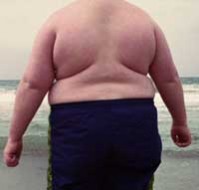Last Updated on: January 19, 2024
Edited By: Alfred
Ever wondered why most obese children wear a sleepy, dull expression most of the time’ Or why they have high chances of being at the bottom of their classes. It’s also been observed that despite the fact that these children try sincerely to loose weight, they are not able to keep away from food for too long. Most of them start believing this happens due to lack of will power to resist temptation. Well, latest finding may have the answer to these questions. This study conducted to study the behavioral pattern of obese children found that the size of their brain is smaller than that of regular, healthy children. It found that the region that controlled the spontaneity in the obese children was smaller than children who were not severely overweight. As per the research, the reason behind the obsession of obese children with food is not lack of self control but due to small size of the portion of the brain also known as the ‘impulse ‘ control region’.? In fact, as per the study, children who have this finding could be predisposed to gaining weight or the obesity may affect the size of the brain starting a vicious circle. This study could rule out the myth that obese children lack the will power to actually lose weight. The researchers believed that it could be due to a change in the general construction of the brain or a trauma in the past that could trigger this cause. Study
For this study, 91 teenagers and their eating habits were studied. The average age of most of these children was 17 years, among them 37 had average weight and 54 of them were obese. The body mass index of the obese teens was found to be 39 and their average weight measured to 300 pounds. As a part of the study, all the teens had to undergo an MRI scan (magnetic resonance imaging). They were also mad to undertake many cognitive tests which aimed at studying the functioning and performance of the frontal lobe of the brain. The frontal lobe is at the anterior side of the brain (below the temple). This part controls the planning, behavior and self-assessment. In case of trauma, the person can have decreased impulse control.
Finding
The finding (eating habit) showed that obese teens were more spontaneous and impulsive while eating. The MRI scan also reported that these children had a smaller orbitofrontal cortex and their performance in the cognitive tests was also poor as compared to the other children who were a part of this study. The fact that all the children belonged to the same strata of the society, ruled out the chances of their economic status playing a part their eating habit. However, the result only hints at an association and not as a cause ‘ effect link. It does not prove that obesity can result in smaller frontal lobe or vice versa. It was also found that though obese children were not diabetic, they also had increased level of fasting insulin which could harm the brain. Insulin is a hormone that increases the absorption of glucose from the blood. As obese people are insulin resistant, they have to produce more of it to keep the glucose level normal.
For this study, 91 teenagers and their eating habits were studied. The average age of most of these children was 17 years, among them 37 had average weight and 54 of them were obese. The body mass index of the obese teens was found to be 39 and their average weight measured to 300 pounds. As a part of the study, all the teens had to undergo an MRI scan (magnetic resonance imaging). They were also mad to undertake many cognitive tests which aimed at studying the functioning and performance of the frontal lobe of the brain. The frontal lobe is at the anterior side of the brain (below the temple). This part controls the planning, behavior and self-assessment. In case of trauma, the person can have decreased impulse control.
Finding
The finding (eating habit) showed that obese teens were more spontaneous and impulsive while eating. The MRI scan also reported that these children had a smaller orbitofrontal cortex and their performance in the cognitive tests was also poor as compared to the other children who were a part of this study. The fact that all the children belonged to the same strata of the society, ruled out the chances of their economic status playing a part their eating habit. However, the result only hints at an association and not as a cause ‘ effect link. It does not prove that obesity can result in smaller frontal lobe or vice versa. It was also found that though obese children were not diabetic, they also had increased level of fasting insulin which could harm the brain. Insulin is a hormone that increases the absorption of glucose from the blood. As obese people are insulin resistant, they have to produce more of it to keep the glucose level normal.


Comments are closed.